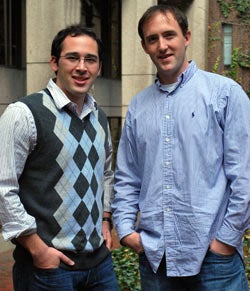In the first post-foreclosure case to be tried in Boston in the current foreclosure crisis, two Harvard Law students landed a $54,000 verdict against the Bank of New York for cutting off the water and heat of a Dorchester man it was trying to force out of the home he rented, which had been foreclosed on after the owner failed to make mortgage payments.
The November 20 verdict—reached by the 12-person jury in Boston Housing Court after a two-day trial and four hours of deliberation—may yet be doubled or tripled under the state’s consumer protection law.
The case was tried by 3Ls David Haller and Eli Schlam of the Harvard Legal Aid Bureau, under the supervision of J. Verner Moore, an HLAB clinical instructor, and with the participation of the HLS WilmerHale Legal Services Center through former student Eric Levine ’08. HLAB and the Center have been collaborating in protecting the rights of tenants in properties that have been foreclosed on in Boston. They are also working in conjunction with CityLife and Greater Boston Legal Services, along with students from other area law schools and universities, urging tenants and other residents not to leave their homes without knowing their legal rights.
“Students are hopeful that the size of the award will encourage banks to improve treatment of tenants in the properties they acquire through foreclosure and to potentially consider maintaining properties instead of evicting people,” said Haller. The case marked his first jury trial.
Harvard Law School clinics are involved in 50 to 100 similar cases now pending, he added. Haller co-founded No One Leaves, an organization of individuals who advise tenants in foreclosed properties to remain in those properties until the entire legal process of eviction is completed. See profile of Haller in The Harvard Crimson.
William Allen, 50, had lived in his Dorchester apartment for four years and paid his rent on time. He learned in December of 2007 that the owner of the property had lost it in a bank foreclosure a month earlier. The city turned the water off because of a pipe leak in the neighborhood, cutting off heat to Allen’s home, which was heated by a forced hot-water system.
When Allen tried to get the water turned back on, he was unsuccessful. He turned to the WilmerHale Legal Services Center in Jamaica Plain. Levine contacted the Bank of New York, which owned the property after the foreclosure, to notify them that Allen was living in the apartment and to ask that the bank turn the heat and water back on. The bank responded to Allen’s request by changing the locks on the door and calling the police to report Allen as a squatter.
Allen, who is on Social Security disability, lived in the property from Dec. 18 to April 10 with no water or heat. Students from HLAB, working with the Legal Services Center, filed a restraining order with the Boston Housing Court to force the bank to turn the water on. The court ordered the bank to pay for Allen to live in a hotel until the water problem was resolved. Allen lived in a hotel for about 10 days, Haller said.
The Bank of New York filed an eviction claim in Boston Housing Court. Allen counterclaimed, alleging that the bank’s shut-off of his water and heat amounted to a forced eviction, and asking for damages.
The case was tried in Boston Housing Court before Judge Jeffrey M. Winik. The jury returned a verdict of $54,000—$4,000 in actual damages plus $50,000 for emotional distress. The verdict could be doubled or tripled under MGL Chapter 93A, the state’s consumer protection act, which could bring it to nearly $165,000 plus attorneys’ fees.
One of the biggest challenges in the foreclosure crisis is that tenants or their lawyers often have difficulty locating the person making decisions on properties, which often are owned by banks in other states, said Haller. “The lawyers we deal with are only in charge of the eviction and don’t have authority to think globally about the problem,” he added. “The lawyers for the bank can’t even get in touch with own clients, who are in Texas or California, and have never even seen the properties.”
